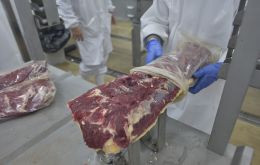MercoPress. South Atlantic News Agency
Tag: Uruguay exports
-
Tuesday, October 3rd 2023 - 09:43 UTC
Uruguayan exports keep downhill path

According to a foreign trade study by the Uruguay XXI Institute released Monday in Montevideo, the South American country's exports continued to fall in the month of September by 9% year-on-year and 18% so far in 2023.
-
Thursday, March 2nd 2023 - 08:53 UTC
Uruguayan February exports 8% less than same month last year

Uruguay's exports, including those shipped out of duty-free zones, totaled US$ 939 million in February of 2023, which represented an 8% decrease. The main reason for this setback was reported to be a drop in sales of beef and by-products, rice, wood, and wooden by-products.
-
Tuesday, May 3rd 2022 - 09:18 UTC
Uruguayan exports on the rise

Uruguayan exports including duty-free zones for the month of April totaled US$ 1.115 billion, according to the Uruguay XXI Institute's monthly report released Monday.
-
Tuesday, November 2nd 2021 - 09:43 UTC
Uruguayan exports on the rise, report shows

Beef, meat by-products and wood have boosted Uruguayan exports, which were reported to have grown 17.2% overall in October, it was announced Monday in Montevideo. Meat sales once again reached record figures.
-
Monday, July 27th 2015 - 06:58 UTC
Uruguay's meat exports in almost seven months close to the billion dollars

Uruguay exports of meats reached 978 million dollars between January and 18 July of which 83% beef; 5,5% offal; 3% ovine; other industrialized meats 2.7% and 1.5% horse, according to the latest release from the country's Meats institute economics office, Inac.
-
Saturday, November 29th 2014 - 07:11 UTC
IDB loan for Uruguay to promote quality investments and exports

The Inter-American Development Bank (IDB) has approved a 120 million dollars loan to finance the second phase of Uruguay's Strategic International Positioning Program. Its goal is to consolidate the country's international positioning, contributing to an increase in investments—mainly those aimed at high value-added sectors— and exports.
-
Monday, December 2nd 2013 - 19:49 UTC
Inflation and competitiveness, Uruguay's main challenges for next year and a slower growing economy

Inflation and competitiveness are the two main macroeconomic challenges faced by Uruguay and does not anticipate an easy 'soft landing', at 3% growth rates in coming years, according to Deloitte during a conference on “Prospects for 2014 and economic challenges for the next government”.
